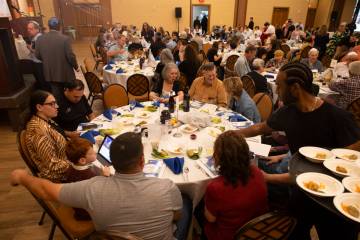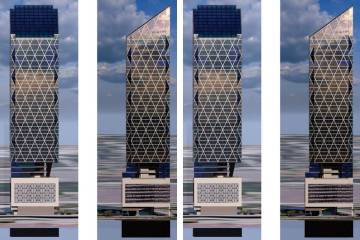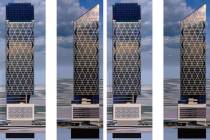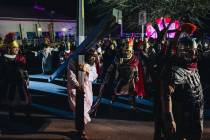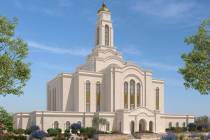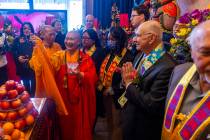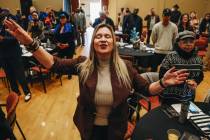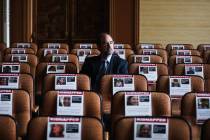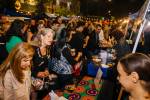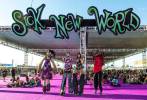A labor of love – Greek style
Every fall for 42 years, St. John the Baptist Greek Orthodox Church has taken a leap of faith and invited the community to sample the tastes, sounds and rituals of its culture.
And the community has responded.
What was once a small endeavor using family recipes and donated supplies has grown into a big business. More than 130,000 guests are expected to crowd the church grounds for this year’s event, which begins Thursday and runs through Sept. 28, adding a fourth day to the festival.
If all goes well, the Wounded Warrior Project and other charitable causes will be the big winners, not the church.
“We pray for no high winds and no rain,” said the Rev. John Hondros, the parish priest. “Many festivals just refill their church’s coffers, but ours is so much more. It’s an outpouring of love.”
Attorney Gus Flangas is chairman of the festival, a job he has relished, with only a few years off, since 1994. He oversees a massive undertaking that involves the church shouldering costs of about $450,000 before a single guest walks through the ticket line.
The expenses start with permits, food ingredients, paper products, advertising, fliers, tickets, building materials, barricade rental, security, portable restrooms, shuttle trams to parking areas. The list goes on. It all starts with and ends with planning and know-how.
In the not-too-distant past, local restaurants donated food, small businesses and stores donated the needs of the festival from paper products to building materials. Now the major donation comes in the form of the labor of the volunteers who make the festival happen.
The parish is proud that church members volunteer to do all of the cooking except for several types of pastries. Other volunteers staff the kitchen, the food booths, the bar, the cafe and the sweets area. Still other volunteers handle publicity, the media, setup and takedown, ticket sales, handling cash, or keeping the festival site spotless.
When it comes to dividing the proceeds, St. John the Baptist recognizes many worthy causes.
Parish officials explained that one-third of the profit from the festival goes to the Metropolis of San Francisco, the church’s headquarters for the western United States, to help fund a robust list of national ministries, philanthropies, youth ministries, wellness ministries, and Greek and religious education (GoArch.org).
Another slice of the money stays home to balance the operating budget, including maintenance of the church, the Panos Hall and its professional hotel kitchen; and maintenance of the grounds.
“Recent capital expenditures have included roof repairs, restorative work on the floors and repairs to the fountains, which we can only turn on at certain times,” Hondros said. “This year’s expected funds have been earmarked for more electric power to be installed in the fields. Then you won’t see any more huge cables.”
Each year, $15,000 was spent on generators and electricians to run cables for the festival. Now with a one-time expense of $40,000, the church will save that annual cost.
Another portion of the proceeds goes to the Ladies Philoptochos Society, translated as “friends of the poor.” Philoptochos regularly provides service to the parish and the larger community through its fundraising and hands-on assistance for liturgical, charitable, educational, youth and crisis needs.
In the past, “a portion of the festival proceeds has gone to local charities such as the Boys and Girls Clubs, disabled veterans and aid to local military families,” Hondros said.
This year, the Wounded Warrior Project has been designated as the recipient of this portion of the proceeds.
The Wounded Warrior Project also will receive 100 percent of the proceeds from the Torch Run Relay, which has become a popular feature of the festival in recent years.
It’s a full 26.2-mile marathon for parishioners and military personnel, scheduled from 2 to 7 p.m. Friday, ending with the lighting of a torch between Corinthian columns at the church. It’s a ceremony with Olympic overtones, a fitting reminder that both the games and the marathon have their origins in Greece.
The run starts at Tivoli Village at 2 p.m. with a torch lighting ceremony. The race progresses along its route with a police escort, ending at 7 p.m. at the church. Participants secure pledges from sponsors, and are assigned a place and time to join and complete their 1 mile (or 4 to 5 miles) portion of the relay. Two limousines follow the run.
One limo awaits those completing their leg(s) of the race with a free ride to their car, if they wish. The second limo takes runners a mile or two down the road to pick up multiple legs of the race, or to the church to participate in the torch lighting ceremony.
All participants receive a T-shirt to commemorate the event and a complimentary meal at a time of their choosing at the festival. The church covers the entire overhead costs for the relay race.
The festival takes months of preparation but it’s a labor of love. “It’s a showcase of our church and our culture,” Flangas said.
There is continuous live music from two bands. There is an extensive play area for the kids and, of course, there’s the food. “We’re proud of our food — you won’t find better lamb,” Flangas added.
The church was founded in 1959, but moved from the old site when the current complex was built in 1991-92.
PREVIEW
What: 42nd annual Greek Food Festival
When: 5-10 p.m. Thursday, 3-11 p.m. Friday, noon-11 p.m. Sept. 27, noon-10 p.m. Sept. 28
Where: St. John the Baptist Greek Orthodox Church, 5300 El Camino Road; shuttle buses serve parking areas nearby
Admission: $6 per day; $10 for a four-day pass (702-221-8245, lasvegasgreekfestival.com)












